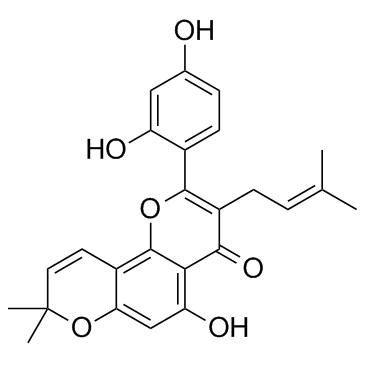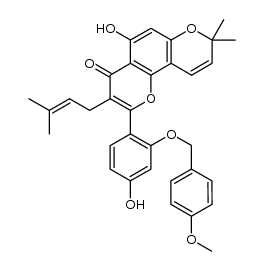62596-29-6
| Name | morusin |
|---|---|
| Synonyms |
TCMDC-124149
Morusin 2-(2,4-Dihydroxyphenyl)-5-hydroxy-8,8-dimethyl-3-(3-methyl-2-buten-1-yl)-4H,8H-pyrano[2,3-f]chromen-4-one 2-(2,4-dihydroxyphenyl)-5-hydroxy-8,8-dimethyl-3-(3-methylbut-2-enyl)pyrano[2,3-h]chromen-4-one Mulberrochromene 2-(2,4-Dihydroxyphenyl)-5-hydroxy-8,8-dimethyl-3-(3-methylbut-2-en-1-yl)-4H,8H-pyrano[2,3-f]chromen-4-one |
| Description | Morusin is a prenylated flavonoid isolated from M. australis with various biological activities, such as antitumor, antioxidant, and anti-bacteria property. Morusin could inhibit NF-κB and STAT3 activity. |
|---|---|
| Related Catalog | |
| Target |
p65 STAT3 |
| In Vitro | Morusin exhibits a dose- and time-dependent inhibitory effect on murine and human breast cancer cells. IC50 is 9.48 μg/mL for normal mammary epithelial cells (MCF-10A); 2.03 and 1.87 μg/mL for murine breast cancer cells (4 T1 and EMT6); and 2.71 and 3.86 μg/mL for human breast cancer cells (MCF-7 and MDA-MB-231), respectively, the maximal inhibition of cell growth (>80 %) is obtained at 8 μg/mL. The apoptotic cells in morusin treated breast cancer cells are increased significantly in a dose-dependent manner[1]. Morusin significantly inhibits the growth and clonogenicity of human colorectal cancer HT-29 cells. Morusin also inhibits the phosphorylation of IKK-α, IKK-βand IκB-β, increases expression of IκB-α, and suppresses nuclear translocation of NF-κB and its DNA binding activity. Dephosphorylation of NF-κB upstream regulators PI3K, Akt and PDK1 is also displayed. In addition, activation of caspase-8, change of mitochondrial membrane potential, release of cytochrome c and Smac/DIABLO, and activation of caspase-9 and -3 are observed at the early time point. Downregulation in the expression of Ku70 and XIAP is exhibited afterward[2]. Morusin suppresses viability of prostate cancer cells, but little effect in normal human prostate epithelial cells. Morusin also reduces STAT3 activity by inhibiting its phosphorylation, nuclear accumulation, and DNA binding activity. In addition, morusin down-regulated expression of STAT3 target genes encoding Bcl-xL, Bcl-2, Survivin, c-Myc and Cyclin D1. It induces apoptosis in human prostate cancer cells by reducing STAT3 activity[3]. |
| In Vivo | Morusin retards the growth of breast cancer significantly. Mean tumor weight of the control mice is 1.14±0.30 g, and those of the mice administrated with 5 and 10 mg/kg of morusin are 0.61±0.23 and 0.41±0.10 g, respectively, tumor inhibitory rates are 46.5 %, and 64.1 %, respectively[1]. |
| Cell Assay | The cytotoxicity of morusin against human normal mammary epithelial cells and murine breast cancer cells (4 T1 and EMT6) and human breast cancer cells (MCF-7 and MDA-MB-231) is tested by modified MTT assay [23]. Cells are treated with various concentrations of morusin (1, 2, 4, 6 and 8 μg/mL). After treatment with morusin for 1, 2, 3, 4, and 5 days, 20 μL MTT (pH 4.7) is added to each well, and cultivated for another 4 h, 100 μL of 10 % SDS/0.01 N HCl is added and incubated at 37 °C overnight to dissolve the formazan. Absorbance is measured at 570 nm[1]. |
| Animal Admin | Mice: Two treatment group mice are injected with 5 and 10 mg/kg of morusin i.p. three times weekly for 4 weeks, respectively, and the control mice are injected with DMSO. During the experiment, mice are weighted, and tumor volumes are measured weekly using calipers and their volumes are calculated[1]. |
| References |
| Density | 1.3±0.1 g/cm3 |
|---|---|
| Boiling Point | 656.7±55.0 °C at 760 mmHg |
| Melting Point | 232-235ºC |
| Molecular Formula | C25H24O6 |
| Molecular Weight | 420.454 |
| Flash Point | 226.9±25.0 °C |
| Exact Mass | 420.157288 |
| PSA | 100.13000 |
| LogP | 6.25 |
| Vapour Pressure | 0.0±2.1 mmHg at 25°C |
| Index of Refraction | 1.636 |
| Storage condition | -20°C |
|
~68% 
62596-29-6 |
| Literature: Tseng, Tsui-Hwa; Chuang, Shien-Kai; Hu, Chao-Chin; Chang, Chia-Fu; Huang, Yu-Chao; Lin, Cheng-Wei; Lee, Yean-Jang Tetrahedron, 2010 , vol. 66, # 6 p. 1335 - 1340 |
| Precursor 1 | |
|---|---|
| DownStream 0 | |
